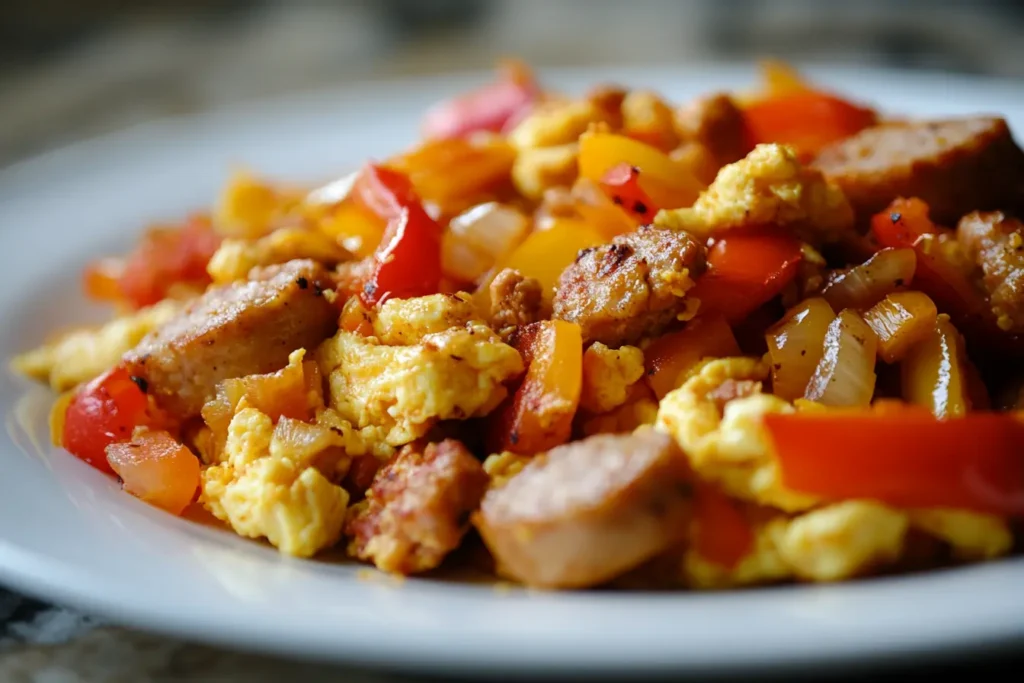When I was a kid, my mother always told me to eat my eggs for breakfast. At that time, I had no idea why it was so crucial. Now, as an adult, I’ve come to appreciate how valuable those morning eggs can be. They keep me satisfied and help me maintain stable energy levels throughout the day. Subsequently, if you’ve never considered animal protein in your morning routine, it might be time to give it a try.
Table of Contents
What is animal protein for breakfast? Understanding the Basics

You might be asking yourself this question as you plan your morning meal. Honestly, I used to skip breakfast entirely. I thought a quick coffee would keep me going, but I soon learned how important a solid breakfast can be, especially one that includes protein. Specifically, what is animal protein for breakfast? It’s a meal that features protein-rich foods derived from animals, such as eggs, dairy, meat, or fish.
Animal protein is often valued for its complete amino acid profile. Essentially, it provides all the essential amino acids your body requires for muscle maintenance, immune function, and overall well-being. Altogether, it can be a powerful way to ensure you start your day on the right nutritional foot. However, some might argue that plant-based proteins also have their merits. Nevertheless, many nutrition experts believe a balanced approach, combining both animal and plant proteins, is particularly helpful.
What is animal protein for breakfast? Key Nutritional Elements
When we talk about what is animal protein for breakfast? we must also consider the vital nutrients. Chiefly, the protein content in animal foods is often higher than in many plant alternatives. Consequently, it can support muscle repair, hormone production, and even enzyme function. Meanwhile, animal-based foods also offer valuable micronutrients. For example, many meats contain zinc and B vitamins, which help your body convert food into energy.
Furthermore, dairy products provide calcium for strong bones and teeth. Eggs are particularly amazing. They include vitamin A, vitamin B12, selenium, and more. Comparatively, fish, especially oily fish, delivers a unique blend of healthy fats and protein. Moreover, certain animal proteins are also easy to prepare in the morning. Scrambling eggs, grilling a slice of lean meat, or whipping up a quick yogurt parfait can be done in minutes. Indeed, a simple start can lead to a more fulfilling day.
What is animal protein for breakfast? Variations and Benefits
Initially, you may only think of eggs paired with a side of toast. However, what is animal protein for breakfast? extends far beyond that classic combination. Another option might include plain Greek yogurt topped with fresh berries and a drizzle of honey. Comparatively, cottage cheese with sliced peaches adds another delicious variety. Additionally, you can try smoked salmon on a whole-grain bagel with low-fat cream cheese.
Equally significant are the benefits you might notice from these choices. Because animal protein can stabilize blood sugar levels, you’ll likely experience fewer hunger pangs before lunch. Consequently, you might reduce unhealthy snacking. Essentially, your body stays fueled, and your mind stays sharp, which can be especially important during busy work or school mornings. Altogether, choosing animal protein can simplify your morning routine and keep you feeling satisfied longer.
What is animal protein for breakfast? Common Sources
Now let’s get even more practical. You may wonder, what is animal protein for breakfast? in terms of actual food options. Let’s face it, we all have different tastes and dietary needs. Nevertheless, a wide range of animal-based proteins can be suitable for your first meal of the day.
- Eggs
- Hard-boiled for meal prep
- Scrambled for a quick fix
- Poached for a fancy twist
- Fried if you’re feeling indulgent
- Dairy Products
- Low-fat or full-fat yogurt
- Cottage cheese with fruit
- Milk with cereal
- Cheese slices or string cheese
- Meat
- Lean turkey sausage
- Chicken sausage
- Thinly sliced steak (for a heartier appetite)
- Lean ground chicken or turkey patties
- Fish
- Smoked salmon on toast
- Tuna salad made the night before
- Sardines with crackers
Incorporate these ingredients into endless breakfast recipes, pairing them with whole grains or fresh produce for added nutrition. Try a spinach-loaded omelet or a yogurt parfait with oats and berries. Avoid extra calories by choosing lean meats and low-fat dairy.
Get creative with nutrient-rich options like eggs, dairy, fish, or lean meats, and pair them with fiber-rich whole grains and vegetables for a balanced, satisfying start to your day.
The Impact of What Animal Protein Is for Breakfast on Weight Management
Have you ever noticed that when you eat a protein-rich breakfast, you’re less tempted to raid the snack drawer later? It’s true. Starting your day with a meal that highlights what is animal protein for breakfast? can help regulate appetite and portion sizes. Protein helps you feel full and can reduce cravings for sugary treats. Consequently, many people find it easier to maintain or reach a healthy weight when they prioritize protein in their morning routine. Indeed, a balanced diet, combined with regular exercise, remains essential. But a protein-packed breakfast is often a game-changer.
Potential Health Concerns
Animal protein offers benefits but requires mindful choices. Red meats often contain saturated fats, raising cholesterol risks; opt for lean cuts like sirloin or tenderloin. Processed meats, such as turkey sausage, should be consumed in moderation due to nitrates and sodium. Choose nitrate-free or low-sodium options when possible.
Lactose-intolerant individuals can consider lactose-free alternatives or aged cheeses for easier digestion. For sustainability and animal welfare, select ethically sourced meats and eggs marked “Cage-Free,” “Grass-Fed,” or “Certified Humane.” Though pricier, many find them worthwhile for taste and peace of mind.
Balance your breakfast with fruits, vegetables, or whole grains alongside animal protein to ensure a nutrient-rich meal. Fiber from produce and grains supports digestion and satiety, forming the foundation of a healthy morning routine.
Tasty Recipe: Hearty Breakfast Scramble

I want to share a personal favorite. Honestly, I didn’t believe it at first, but this really is the best quick scramble, at least in my kitchen! It’s packed with vegetables, cheese, and turkey sausage crumbles. You can whip this up in under 15 minutes, and it tastes like a weekend treat every day of the week.
Ingredients You’ll Need:
- 3 large eggs
- 2 turkey sausage links (cooked, crumbled)
- 1/4 cup diced onions
- 1/4 cup diced bell peppers
- 1/4 cup shredded cheddar cheese
- 1 tablespoon olive oil
- Salt and pepper to taste
- Optional: a dash of hot sauce if you like a little kick
Step-by-Step Expanded Cooking Instructions
- Heat the Pan: Place a nonstick skillet on medium heat. Add the olive oil and allow it to warm up for about 1 minute.
- Sauté the Veggies: Throw in your diced onions and bell peppers. Cook them for roughly 3 minutes, stirring occasionally. Eventually, they’ll become slightly soft and caramelized.
- Crack the Eggs: Meanwhile, crack the eggs into a small bowl. Whisk them vigorously with a fork. Add a pinch of salt and a sprinkle of pepper.
- Combine Ingredients: Reduce the heat slightly. Add the whisked eggs to the pan with the softened veggies. Stir gently so that the eggs spread evenly across the skillet.
- Add Turkey Sausage: Once the eggs begin to set, sprinkle the crumbled turkey sausage on top. This step ensures the flavor is evenly distributed.
- Fold in Cheese: Next, add the shredded cheddar cheese. Fold the eggs gently, allowing the cheese to melt throughout.
- Finish Cooking: Let the mixture cook until the eggs are no longer runny. This usually takes another minute or so. However, avoid overcooking. You want them soft and fluffy.
- Serve and Enjoy: Slide the scramble onto a plate. Top with hot sauce if desired. Serve immediately with a side of whole-wheat toast or fresh fruit.
Nutritional Information (Per 100g)
| Nutrient | Amount |
|---|---|
| Calories | 150 kcal |
| Protein | 10 g |
| Fat | 10 g |
| Saturated Fat | 3 g |
| Carbohydrates | 2 g |
| Fiber | 1 g |
| Sugar | 1 g |
| Sodium | 350 mg |
Basically, this hearty scramble gives you a solid dose of high-quality animal protein from the eggs and turkey sausage. Meanwhile, the vegetables boost the vitamin content. Consequently, you’ll feel full and satisfied, making it much easier to keep midday cravings at bay.
Additional Tips for a Balanced Breakfast
Another important factor to consider is variety. Accordingly, don’t get stuck eating the same scramble every morning. Instead, rotate your ingredients. For example, switch up bell peppers for spinach or kale. Likewise, try different types of cheese or add some mushrooms for extra earthiness.
Furthermore, hydration plays a crucial role in how you feel in the morning. Indeed, pairing your breakfast with a glass of water or herbal tea can improve digestion. Coffee is fine too, but remember to drink plenty of water, especially if you consume caffeine regularly.
Equally notable is meal timing. Some people like to eat immediately after waking up. Others need an hour or two to build an appetite. Whichever approach you choose, make sure you provide your body with a steady stream of nutrients throughout the day. Generally, it’s best to avoid going too long without food, as that can lead to excessive hunger and impulsive snacking later on.
Finally, try to include some high-fiber foods like whole-grain toast, oatmeal, or fresh fruit alongside your animal protein. Comparatively, fiber aids digestion and helps maintain stable blood sugar levels. Thus, a balanced meal that includes lean protein, healthy fats, and complex carbohydrates can set you up for a successful day.
Frequently Asked Questions (FAQs)
What is an animal based protein breakfast?
An animal-based protein breakfast is a morning meal that primarily features foods derived from animals, such as eggs, dairy, meat, or fish. Essentially, it includes items like scrambled eggs, yogurt parfaits, and lean turkey sausage. The main goal is to supply the body with complete proteins, which carry all the essential amino acids you need for muscle and tissue repair.
What is the best meat protein for breakfast?
This depends on your health goals and preferences. Many people choose lean meats like turkey sausage or chicken sausage because they are comparatively lower in saturated fat. Steak can also be an option if it’s lean. Others opt for fish like salmon, which is high in omega-3 fatty acids. Ultimately, the best choice is one that fits your dietary needs and taste preferences.
What foods are considered animal protein?
Foods considered animal protein come from animal sources. They include meats (such as beef, pork, and chicken), fish (like salmon, tuna, and sardines), eggs, and dairy products (milk, cheese, and yogurt). Basically, these foods offer high-quality protein and a host of micronutrients. That makes them an excellent option for breakfast or any other meal throughout the day.
What is good protein for breakfast?
Good protein for breakfast is any option that provides a wide range of amino acids and supports your energy needs. While what is animal protein for breakfast? is a popular question, the answer can vary based on individual goals. Eggs are often a go-to for many because they’re quick to cook and full of essential nutrients. Yogurt, cottage cheese, and lean meats are also solid choices. Pairing these proteins with fiber and healthy fats generally yields the most balanced meal.
Conclusion
What is animal protein for breakfast? It’s a direct route to a strong nutritional start. By including eggs, dairy, fish, or lean meats in your morning meal, you’re giving your body vital amino acids and essential micronutrients. Particularly, these proteins help build and repair muscles, support the immune system, and keep your energy stable. Moreover, they can help curb midmorning hunger and prevent excessive snacking on sugary treats.
Personally, I’ve found that starting my day with animal protein makes a noticeable difference in my energy levels and mood. Sure, we all love a sweet pastry now and then. But making room for nutrient-dense options first thing in the morning can dramatically impact your overall health. Eventually, you might discover new flavors and textures that reinvent your morning routine. So why not give it a try?
Remember, breakfast can be a fun, creative experience. Don’t be afraid to experiment with new foods or cooking methods. Indeed, what is animal protein for breakfast? can be more diverse, flavorful, and beneficial than you ever imagined.
Print
What is animal protein for breakfast? 4 Expert Tips for Your Morning Routine
- Total Time: 15 minutes
- Yield: 2 servings 1x
Description
A protein-packed breakfast scramble with eggs, turkey sausage, and vegetables for a balanced morning meal.
Ingredients
3 large eggs
2 turkey sausage links (cooked, crumbled)
1/4 cup diced onions
1/4 cup diced bell peppers
1/4 cup shredded cheddar cheese
1 tablespoon olive oil
Salt and pepper to taste
Optional: a dash of hot sauce if you like a little kick
Instructions
1. Heat a nonstick skillet over medium heat and add the olive oil.
2. Sauté the diced onions and bell peppers for about 3 minutes until softened and lightly caramelized.
3. Crack the eggs into a bowl, whisk vigorously with salt and pepper, then pour into the skillet with the veggies.
4. Stir gently to spread the eggs evenly and let them begin to set.
5. Sprinkle the crumbled turkey sausage over the eggs, then add the shredded cheddar cheese.
6. Fold the eggs to combine cheese and sausage and cook until no longer runny, about 1 more minute.
7. Slide the scramble onto a plate, top with hot sauce if desired, and serve immediately.
Notes
1. Choose lean, high-quality animal proteins like turkey sausage or chicken sausage.
2. Prep your meat and chop veggies the night before for a faster morning routine.
3. Balance your scramble with colorful vegetables for added fiber and nutrients.
4. Use nonstick cookware and moderate heat to keep eggs soft and fluffy.
- Prep Time: 5 minutes
- Cook Time: 10 minutes
- Category: Breakfast
- Method: Scramble
- Cuisine: American
Nutrition
- Serving Size: 1 serving
- Calories: 150
- Sugar: 1g
- Sodium: 350mg
- Fat: 10g
- Saturated Fat: 3g
- Trans Fat: 0g
- Carbohydrates: 2g
- Fiber: 1g
- Protein: 10g
